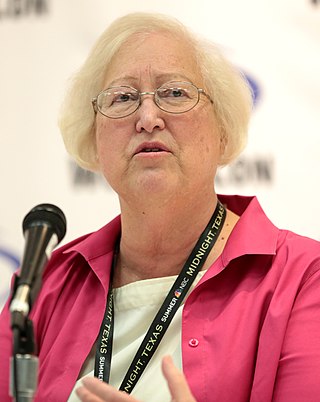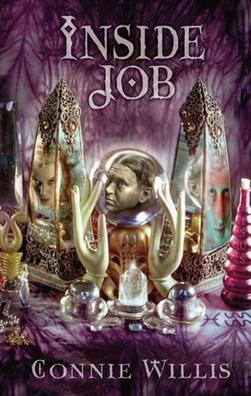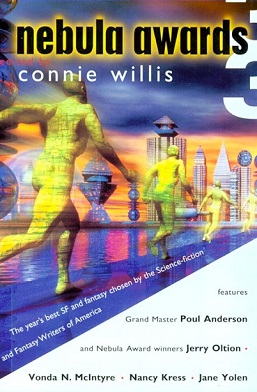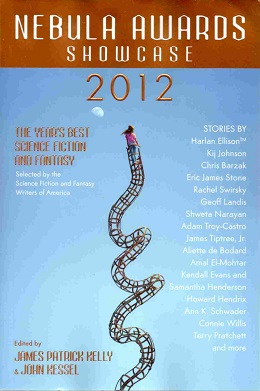Related Research Articles

Emily Elizabeth Dickinson was an American poet. Little-known during her life, she has since been regarded as one of the most important figures in American poetry. Dickinson was born in Amherst, Massachusetts, into a prominent family with strong ties to its community. After studying at the Amherst Academy for seven years in her youth, she briefly attended the Mount Holyoke Female Seminary before returning to her family's home in Amherst. Evidence suggests that Dickinson lived much of her life in isolation. Considered an eccentric by locals, she developed a penchant for white clothing and was known for her reluctance to greet guests or, later in life, even to leave her bedroom. Dickinson never married, and most of her friendships were based entirely upon correspondence.

Joe William Haldeman is an American science fiction author.

Asimov's Science Fiction is an American science fiction magazine published by Penny Press and edited by Sheila Williams. It was launched as a quarterly by Davis Publications in 1977, after obtaining Isaac Asimov's consent for the use of his name. It was originally titled Isaac Asimov's Science Fiction Magazine, and was quickly successful, reaching a circulation of over 100,000 within a year, and switching to monthly publication within a couple of years. George H. Scithers, the first editor, published many new writers who went on to be successful in the genre. Scithers favored traditional stories without sex or obscenity; along with frequent humorous stories this gave Asimov's a reputation for printing juvenile fiction, despite its success. Asimov was not part of the editorial team, but wrote editorials for the magazine.

Constance Elaine Trimmer Willis, commonly known as Connie Willis, is an American science fiction and fantasy writer. She has won eleven Hugo Awards and seven Nebula Awards for particular works—more major SF awards than any other writer—most recently the "Best Novel" Hugo and Nebula Awards for Blackout/All Clear (2010). She was inducted by the Science Fiction Hall of Fame in 2009 and the Science Fiction Writers of America named her its 28th SFWA Grand Master in 2011.
The Hugo Award for Best Novella is one of the Hugo Awards given each year for science fiction or fantasy stories published or translated into English during the previous calendar year. The novella award is available for works of fiction of between 17,500 and 40,000 words; awards are also given out in the short story, novelette and novel categories. The Hugo Awards have been described as "a fine showcase for speculative fiction" and "the best known literary award for science fiction writing".
"Even the Queen" is a science fiction short story by Connie Willis, exploring the long-term cultural effects of scientific control of menstruation. It was originally published in 1992 in Asimov's Science Fiction, and appears in Willis' short-story collection Impossible Things (1994) and The Best of Connie Willis (2013), as well as in the audio-book Even the Queen and Other Short Stories (1996).

Inside Job is a novella by American writer Connie Willis, originally published in the January 2005 issue of Asimov's Science Fiction and later as a hardback by Subterranean Press. In the story, a debunker of pseudoscience encounters a fake medium who seems to be genuinely channelling the disruptive spirit of H. L. Mencken. It was the winner of the 2006 Hugo Award for Best Novella.

Fire Watch is a book of short stories by Connie Willis, first published in 1984, that touches on time travel, nuclear war, the end of the world, and cornball humour.

The 64th World Science Fiction Convention (Worldcon), also known as L.A.con IV, was held on 23–27 August 2006 at the Anaheim Convention Center and the nearby Hilton and Marriott hotels in Anaheim, California, United States.

There have been two groups called the H. G. Wells Society, both set up to support the ideas of Herbert George Wells (1866–1946).

Alyxandra Margaret "A. M." Dellamonica is a Canadian science fiction writer who has published over forty short stories in the field since the 1980s. Dellamonica writes in a number of subgenres including science fiction, fantasy, and alternate history. Their stories have been selected for "Year's Best" science fiction anthologies in 2002 and 2007. Dellamonica is non-binary.

The 55th World Science Fiction Convention (Worldcon), also known as LoneStarCon 2, also known as "The Second Occasional LoneStarCon Science Fiction Convention & Chili Cook-off", was held on 28 August–1 September 1997 at the Marriott Rivercenter, Marriott Riverwalk, and the Henry B. Gonzalez Convention Center in San Antonio, Texas, United States. The first LoneStarCon, held in Austin, Texas, had been the North American Science Fiction Convention (NASFiC) in 1985, when the 43rd Worldcon was held in Australia.
The 51st World Science Fiction Convention (Worldcon), also known as ConFrancisco, was held on 2–6 September 1993 at the ANA Hotel, Parc Fifty Five, and Nikko Hotels and the Moscone Convention Center in San Francisco, California, United States.
The New Hugo Winners was a series of books which collected science fiction and fantasy short-form works that had recently won a Hugo Award for best Short Story, Novelette or Novella. Published by Baen Books, the series succeeded Doubleday's The Hugo Winners following that series' discontinuation after volume five. The New Hugo Winners ran for four volumes, published in 1989, 1992, 1994, and 1997, together collecting stories that had won the award from 1983 to 1994. The first two volumes were edited by Isaac Asimov. Due to Asimov's death in April 1992, the third volume was edited by Connie Willis and the fourth by Greg Benford.
"The Last of the Winnebagos" is a short story written by American writer Connie Willis. It was first published in Asimov's Science Fiction Magazine in 1988, and reprinted in the short story collections Impossible Things (1994) and The Best of Connie Willis (2013).
"Fire Watch" is a science fiction novelette by American writer Connie Willis. The story, first published in Isaac Asimov's Science Fiction Magazine in February 1982, involves a time-traveling historian who goes back to the Blitz in London, to participate in the fire lookout at St. Paul's Cathedral.
Connie Ann Kirk is an American author. Her books cover a range of subjects including concise literary biographies for students, bio-critical literary studies, and references. She has also written a fiction picture book for children. Her articles, both in print and online, address topics in literature, poetry, popular culture, history, education, art, television, science, sports, and film.

Nebula Awards 33 is an anthology of science fiction short works edited by Connie Willis. It was first published in hardcover and trade paperback by Harcourt Brace in April 1999.

Nebula Awards Showcase 2012 is an anthology of science fiction short works edited by James Patrick Kelly and John Kessel. It was first published in trade paperback by Pyr in May 2012.
"The Diary of the Rose" is a 1976 dystopian science fiction novelette by Ursula K. Le Guin, first published in the Future Power collection. The tale is set in a totalitarian society which uses brainwashing by "electroshocks" to eradicate any kind of political dissent.
References
- ↑ The Soul Selects Her Own Society: Invasion and Repulsion: A Chronological Reinterpretation of Two of Emily Dickinson's Poems: A Wellsian Perspective at the Internet Speculative Fiction Database; retrieved December 10, 2016
- ↑ 1997 Hugo Awards, at TheHugoAwards.org; retrieved December 10, 2016
- ↑ Where to Start with the Works of Connie Willis, by A. M. Dellamonica, at Tor.com; published June 24, 2015; retrieved December 10, 2016
- ↑ Book Review: Glenn Yeffeth, ed; The War of the Worlds: Fresh Perspectives on the H. G. Wells Classic, reviewed by John S. Partington; in The Wellsian, No. 29, page 53; archived at Durham University; published 2006; retrieved December 10, 2016
- ↑ Scide Splitters: LoveStar by Andri Snaer Magnason Archived 24 August 2017 at the Wayback Machine , reviewed by David Kilman, at Amazing Stories ; published June 24, 2015; retrieved December 10, 2016